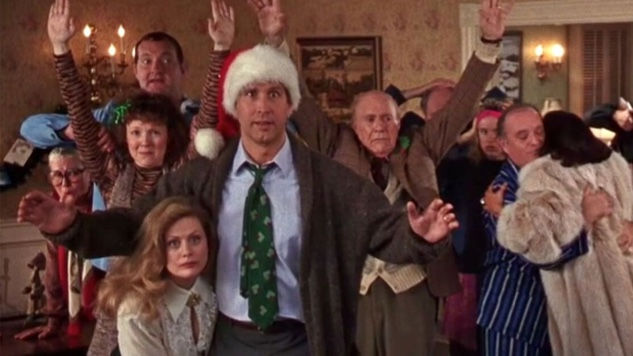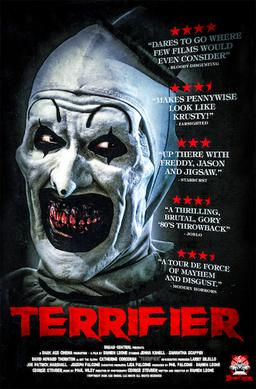National Lampoon's Christmas Vacation (1989) review
- Jeremy Kelly
- Dec 2, 2021
- 5 min read
National Lampoon’s Christmas Vacation (1989)
Directed by: Jeremiah S. Chechik
Produced by: John Hughes, Tom Jacobson
Screenplay by: John Hughes
Starring: Chevy Chase, Beverly D’Angelo, Juliette Lewis, Johnny Galecki, Randy Quaid

It’s fair to say that most of us have our annual holiday traditions: where we go, who we see, what we eat, and what we watch. We see a Christmas movie on TV, and know, “Well, I have to watch this.” But the one that I grew up on, that my family would watch every 24th of December, is “National Lampoon’s Christmas Vacation.” Released in 1989—just a few months before I was born—it’s the second sequel in the comedic “Vacation” franchise, following the misadventures of the Griswold family as they road tripped to Walley World amusement park and then traveled across Europe. This time, patriarch Clark (Chevy Chase) is hoping for a “fun, old-fashioned family Christmas” at home, but experiences one calamity after another. Loaded with quotable lines and humor that’s both outrageous and relatable, it’s one of the great “edgy” Christmas classics.
There isn’t much of an overall plot; it’s just about Clark, his wife Ellen (Beverly D’Angelo), and their daughter Audrey (Juliette Lewis) and son Rusty (Johnny Galecki) undergoing all the tasks and trials of a typical Christmas season. They go out to find a tree, Clark hangs lights up on the house, relatives come over, they go sledding down a hill, Clark stresses about his year-end work bonus, etc. Of course, everything that happens results in some bizarre misfortune; Clark picks out the biggest tree in the lot only to realize he forgot the saw, there are 25,000 twinkle lights that don’t even work initially, the in-laws don’t all get along and some of them are way too boorish, Clark ends up sledding through highway traffic before wiping out in a Walmart parking lot, and the much-needed bonus turns out weirdly underwhelming. Clark tries to stay positive throughout the ordeal, but just how much of the holiday madness can he take before going on a psychotic rampage?
I grew up in a very similar household as the awkward younger brother of a somewhat cynical older sister and son of an enthusiastic, bumbling father and loving, anxious mother (love you Dad, Mom and Kristin!), so there’s a lot in these characters, especially in this setting, that really speaks to me. And yes, I know that Audrey and Rusty have completely switched ages since the first movie, but let’s not worry about that right now; there’s a surprising amount of depth to them. In one of her first film roles, Juliette Lewis plays Audrey as a teenage girl who’s obviously embarrassed by so much time with her family, but still encouraging of her dad’s crazy ideas; I always remember her and Clark’s little interaction after the house lights fail. Rusty, meanwhile, doesn’t get too many scenes to shine, but he and Clark have a believable rapport, very reminiscent of me and my own dad’s, that stands out to me more than with Anthony Michael Hall’s portrayal, even though it’s probably the superior performance to Johnny Galecki.

But of course, the stars of the film are the adults, particularly Chevy Chase as Clark. When you look at some of his conduct through these movies, you realize he’s kind of a dick; he purposely instigates aggressive drivers with his wife and kids in the car, flirts with Mary (Nicolette Scorsese) the lingerie counter clerk, and puts in an advance payment for a swimming pool he can’t yet afford behind Ellen’s back. But he has such wide-eyed optimism and this clear, understandable goal of providing for his family that he’s still very likeable. Also, his facial expressions and the hijinks he gets into are just hilarious: his struggles with the lights, the turkey dinner disaster, and maybe one of the most memorable profanity-laden rants ever against his boss Frank Shirley (Brian Doyle-Murray). No joke, the first time I watched it, I was laughing so hard I had to step into the next room; now I can recite this outburst word-for-word.
Aside from Chase and Beverly D’Angelo—who always have this pitch-perfect chemistry—there’s a great assemblage of veteran character actors. John Randolph and Diane Ladd have some sweet little moments as Clark’s parents Clark Sr. and Nora, E.G. Marshall and Doris Roberts are appropriate foils as Ellen’s parents Art and Frances, while Mae Questel—the voice of Betty Boop—and William Hickey provide some of the funniest lines in the movie as Clark’s Aunt Bethany and Uncle Lewis. They arrive on Christmas Eve, and she’s a senile biddy who wraps up her cat as a gift and leads a prayer of the Pledge of Allegiance, while he’s a cigar-smoking grump who burns down the tree and calls Clark “Grizz.” But the supporting character we all remember is Ellen’s white trash cousin Eddie (Randy Quaid), who shows up uninvited in his tacky family RV and proceeds to make Clark’s life a living Hell with his impossibly crass and outlandish—but still well-intentioned—behavior. The character’s popularity actually led to a made-for-TV spinoff in 2003 subtitled “Cousin Eddie’s Island Adventure.”

Unlike the first two movies, the directing in “Christmas Vacation” isn’t so refined; following the footsteps of comedic giants Harold Ramis and Amy Heckerling is first-timer Jeremiah S. Chechik, who’s not quite as disciplined with timing and characterization, although I really like the way he utilizes various Christmas music and visuals. But some of the choices are a little strange, like the animated opening with Santa Claus and his reindeer, or some of the set pieces just pushing suspension of disbelief a little too far; the scene where Frances accidentally locks Clark in the attic is funny because of the slapstick, and frustrating, because, really, why would she not think somebody’s up there with the door open? But these really don’t bring the movie down, as the characters and situations are more than enough to keep you laughing, and there are plenty of welcome subtle touches. Reportedly, the movie was originally going to be directed by Chris Columbus, but he left the project after clashing with Chase. It’s also the last movie in the series written by John Hughes, who based it on “Christmas 59,” his short story published in “National Lampoon” magazine; a year later, he wrote another Christmas classic, “Home Alone,” directed by Columbus.
There’s honestly a lot more I could talk about, like the Griswolds’ yuppie neighbors Todd (Nicholas Guest) and Margo (Julia Louis-Dreyfus), Clark’s sap-coated fingers tearing through the magazine, the squirrel attack, or Clark’s swimming pool fantasy of Mary—in my opinion, it’s only because of “Fast Times at Ridgemont High” that it’s just the second-best pool striptease in film history—but let’s face it, you all probably know this movie pretty well. And if you don’t, then do yourself a favor and give it a watch. Eight years later, there was another sequel called “Vegas Vacation,” the first to drop “National Lampoon” from the title, and in 2015, there was “Vacation,” which featured Ed Helms as a grown-up Rusty taking his family to Walley World. The former has funny highlights, even though the overall product is dull and predictable, while the latter is just a pale, overly raunchy and stupid imitation of the original. Overall, this is the one I always come back to; it has a mixture of slice-of-life schadenfreude and off-the-wall absurdity that portrays Christmas as a holiday full of both aggravation and joy.
My rating: 9.5/10





Comments